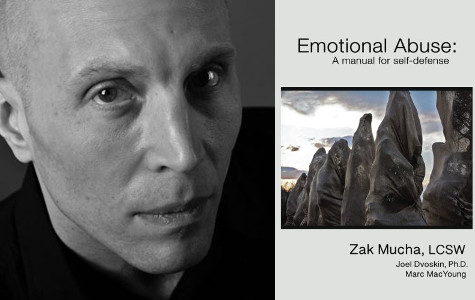
Fiction is about getting inside the heads of people, whether they are like us or unlike us. When writers depict a sociopath, how close can they get? Is it possible to represent a mental state we can’t experience? Even therapists and psychologists can get it wrong. When we are talking to a person who, by definition, lies for their own benefit, can they let enough of their true self slip through their mask so that an observer can truly know how they think?
Zak Mucha, LCSW, is a psychotherapist who worked on the streets of Chicago treating mentally ill homeless clients before he moved into private practice. He is the author of Emotional Abuse: a Manual for Self-Defense, which explains the behavior of emotional abusers of all kinds and, more importantly, how to deflect their attacks. It is a short, pragmatic, and concise book that explains how to recognize different types of systematic diminishment and the expected response.
Last year, I asked my fellow writers what frightened them more: someone without empathy or conscience, or someone who has these qualities but willfully chooses to ignore them to get what they want. Part of the question was to prod at the current fascination with the psychopath or sociopath.
Fictional examples include the social climber killer in Ira Levin’s A Kiss Before Dying, Amazing Amy from Gone Girl, Anton Chigurh from No Country for Old Men, Jimmy the Gent from Goodfellas, and so on. Then, there are characters who seem to successfully wrestle with their conscience, such as Tony from The Sopranos and Walter White from Breaking Bad.
I asked Mr. Mucha about these characters to see which, if any, get it “right.”
Thomas Pluck: There are people without empathy and people who have selective empathy. Psychopaths surely exist, but is the “psychopath” just a faddish bugaboo, given that abusers who don’t fall into that definition are plentiful and can be just as dangerous?
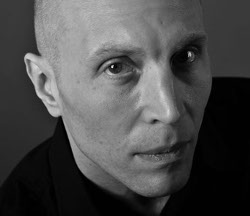
The diagnosis of Anti-Social Personality Disorder is behavior-based, but the most important part of that diagnosis is the lack of empathy: the inability to actually feel the pain of other people. Many people without empathy can fake it, say the right things, and perform—on the surface at least—all the requirements of society so they do not get incarcerated. But that lack of empathy is a real factor in decision making. Unless a person is highly, highly intelligent, their decision making is going to seem off or inconsistent to the person with empathy. We end up saying, “They must be crazy…”
You mentioned the killer from No Country for Old Men—I saw the movie, didn’t read the book—and the character is a hollow shell. All one remembers is the bowl haircut and the weaponry, precisely because there’s little else there internally. Without those props, the person without empathy is a droning bore because the only thing they care about is their own pain.
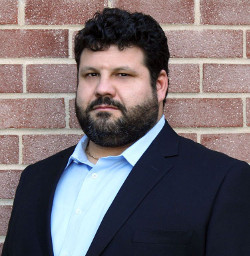
TP: We rarely see this depicted in fiction, even the best serial killer narratives. For example, in Joyce Carol Oates's Zombie, based on Jeffrey Dahmer, the killer doesn't see other people as human but never sets off any warning signs. In Dexter, they play up his social awkwardness as a nerd-like obsession with his job (which we often mistakenly compare to Asperger's Syndrome). Do you have an example of a fictional depiction that portrays that “offness” well?
ZM: Since it's a part-time job keeping up with Joyce Carol Oates's output, I have to say I don't know her book, but the idea there's “no warning” is the mythology that pop culture has picked up. We do have warning signals—they're not universal, but they are internal, and there are tons of them. All our signs of discomfort—whether it's goosebumps, a chill, the sense that we want to back away from someone, or the sense that we had better please them or else—are there, but we've been socialized to ignore them. We tell ourselves we're not being “nice” if we note these warning signals. The social lesson of “being nice” means nothing more than “ignore your own pain” and “ignore those things that do not fit.” Essentially, doubt your own senses.
I do not believe there were no warnings about Jeffrey Dahmer. Didn't the cops catch him chasing a naked man out of his apartment in the middle of the night? This guy's life fit every other aspect of a healthy life? He had people in his life, relationships? Had people over to watch Packers games?
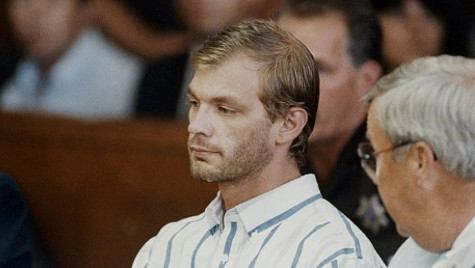
Outside fiction, one of the best examples of a community and family ignoring these signs of a true predator is in Jack Olsen's book, Son. Olsen was the best of the old-school crime writers. He did all the leg work. In this book, he shows how a rapist camouflages himself in suburban life. The warning signs are there, but the people around him, including his family who protected him, refused to accept the signals. It’s a hard read.
TP: I think another part of it is true psychopaths are too alien to appeal to us if we understand them too closely. You quote Carl Panzram, who was perfectly honest in how he thought everyone thought exactly like him but put on a show to hide it. To appeal to the reader, the psychopathic fictional villain is often portrayed as our naughty side doing what we dream of doing if there were no consequences. And the super-intelligent killer outsmarts victims and police instead of simply using our desire to be polite against us. And this works in fiction as well. For example, Walter White in Breaking Bad. Not the best portrayal, but I bring him up because viewers expressed their hatred not for him but for his wife Skyler, who tried to rein him in. Carmela Soprano got the same treatment, and so did Lorraine Bracco (Karen) in Goodfellas when she confronted Henry Hill (Ray Liotta). Do you think it's garden-variety misogyny, or are we falling for their sociopathic shtick?
ZM: Panzram was honest when there was no point in being anything else. But in the book, I also quote Son of Sam when he gleefully brags about the psychiatrists he gamed into thinking he was mentally ill (in the legal sense: Not-Guilty-by-Reason-of-Insanity). With the team I used to run, a lot of my job depended on being able to differentiate between criminal behavior and criminal behavior due to a mental illness.
A lot of the representations of crime you're describing are definitely pure male fantasies, and yes, they’re fueled by much misogyny. Breaking Bad I had no patience for—I wasn't buying the story of the dweeb who has a brutal crimelord within. But Goodfellas—from Nicholas Pileggi's book, Wiseguy—is an amazing piece of journalism. These guys were sociopaths. That Pileggi (and Scorsese) could make us care about these guys is an impressive feat. And sociopathy is not limited to males, obviously, but the stereotype rarely includes women. Look at Gone Girl—one of the most chilling lines was when Amy said, after she returned home, “I need to feel safe.” This was not a plea, but a threat.
TP: We're seeing more female psychopath characters now, beyond the femme fatale. Alissa Nutting's Tampa has a straightforward sexual predator, a teacher who rapes her male students and plays with how our culture doesn't see her as a rapist. It's very similar to Lolita, where Humbert says he has scratches all over his forearms and yet some readers describe it as a “romance.” She's a master of emotional abuse in the book. My favorite is Shirley Jackson's We Have Always Lived in the Castle because it depicts normal family life with someone who poisoned most of her family. And we sympathize with her.
Beyond obvious predators, the literary tradition of the “fucked-up family” novel may be better for emotional abuse. When it's been passed down for generations, the dysfunction is often so twisted that seeing it from the outside is like observing an alien planet. Your book was helpful to me, especially in describing the “impossible” task of the sibling who has to raise the family but never take too much credit, for example.
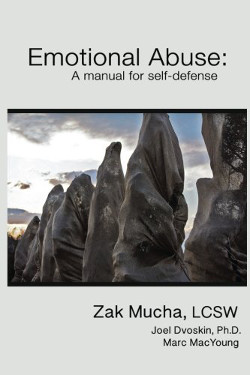
ZM: This is why emotional abuse is as pernicious and damaging as physical or sexual abuse—when the emotional abuse is effective, it changes the definitions of all relationships. The abuse becomes “normal,” and if the victim feels any pain, they are taught to blame themselves for it. The child becomes the caregiver, and also the potential poisoner, of the family. They are taught that everyone else's health and happiness depends on them being “good” and “nice.” Any conflict is their fault. The victim has to absorb the pain for the family.
Shirley Jackson's work can be an apt metaphor for the emotionally abused and neglected child who is taught they are the monster in the family. In my book, you can see this in the chapter where I diagrammed a letter Jerry Sandusky wrote to one of the victims—each line is a manipulation, a shifting of reality, blaming the child he raped for refusing to “stay in the family.”
TP: And one last question, since it is impossible to ignore a text on emotional abuse without addressing the elephant in the room. There’s a public figure who has been pop-diagnosed by many to be a psychopath, a sociopath, a narcissist, and a gaslighter—even when the psychologist who defined Narcissistic Personality Disorder for the DSM claims he is not an example of someone with that illness.
We are too eager to pin behavior on a disorder, either as a pejorative (when they are our adversary) or to shift blame (when they are a member of our group, and we want to protect them). Without assigning a mental illness to President Trump, he clearly uses the weapons of the emotional abuser: denying what he said, shifting the blame to the victim by saying we misunderstood what he said, and framing himself as the victim once he is caught in his lies. Any other observations or behavior you’ve seen him exhibit that less-experienced viewers should watch for?
ZM: I've seen pretty much what everyone in the country has seen. There's enough info, interviews, footage, and history for people to label him with any of the diagnoses that are dependent upon a lack of empathy. But, and this is the point of the book in many ways, so what? We have to do something about a person in our lives who continues to attack and insult others, claiming his own victimhood and the target's own opposition to his aggression to be the cause of his behavior. His press conference sounded just like an abusive patriarch telling the family why they were so selfish and ungrateful because they opposed him.
I'm in private practice now, and Trump has taken up a lot of space in sessions precisely because he's reminding people of abusers they had to fight to get away from, fight to define their own lives. One thing the guy is, other than a cowardly bully and a bullshit artist, is a litmus test for us individually and as a culture. What scares me most is that we can end up identifying a lack of empathy as a sign of strength. A lack of empathy becomes the norm and “might makes right” becomes the accepted rule.
Learn more about or order a copy of
| Emotional Abuse: A Manual for Self-Defense | |
|
| Bad Boy Boogie | |
|
Zak Mucha, LCSW, is a psychotherapist in private practice in Chicago. He spent seven years working as the supervisor of an Assertive Community Treatment (ACT) program, providing 24/7 services to persons suffering from severe psychosis, substance abuse issues, and homelessness. Mucha has also worked as a counselor and consultant for U.S. combat veterans undergoing training for digital forensic investigations in child pornography. He is a board member at the Legislative Drafting Institute for Child Protection (www.ldicp.org) in Baton Rouge as well as a student and clinical associate faculty member at the Chicago Center for Psychoanalysis. His latest book is Emotional Abuse: A Manual for Self-Defense.
Thomas Pluck is the author of Bad Boy Boogie, a Jay Desmarteaux crime thriller from Down & Out Books, and Blade of Dishonor, an action adventure that BookPeople called “the Raiders of the Lost Ark of pulp paperbacks.” He has slung hash, worked on the docks, fought in Japan, and even cleaned the Guggenheim museum (but not as part of a clever heist). He hails from Nutley, New Jersey, home to criminal masterminds Martha Stewart and Richard Blake, but has so far evaded capture.

Interesting that you brought Trump into this interview but failed to mention Hillary. Her actions have shown a history of mental illness. Observe her interviews following her defense of a convicted child rapist, observe the way she spoke about the 12 year old rape victim. Read about the way she tried to bury the voices of the women who spoke out against her husband. Study her response to the attack in Benghazi. Research statements given by former secret service members who served her and her husband in the White House when they describe how she treated them. She is a prime candidate for personality disorders.
It’s important to recognize and understand the different personality disorders and mental health issues that can harm others. In addition to that, it’s equally important to prioritize our own mental health and seek help when needed. That’s why I want to mention an article that offers valuable information about online therapy services. The Auburn Reporter’s “5 Best Online Therapy Services” provides a useful guide to find the right online counseling site or virtual therapy app, perosnally for me I have decided to pick up from the list the platform named Calmerry. By taking care of our mental health, we can not only improve our own well-being but also contribute to creating a healthier and more empathetic society.